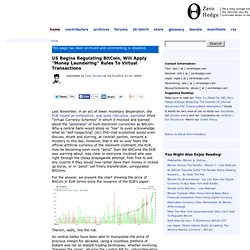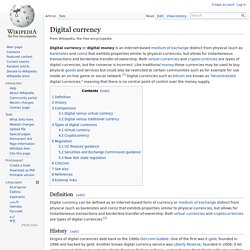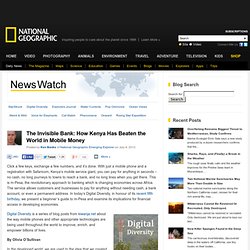

US Begins Regulating BitCoin, Will Apply "Money Laundering" Rules To Virtual Transactions. Last November, in an act of sheer monetary desperation, the ECB issued an exhaustive, and quite ridiculous, pamphlet titled "Virtual Currency Schemes" in which it mocked and warned about the "ponziness" of such electronic currencies as BitCoin.

Why a central bank would stoop so "low" to even acknowledge what no "self-respecting" (sic) PhD-clad economist would even discuss, drunk and slurring, at cocktail parties, remains a mystery to this day. However, that it did so over fears the official artificial currency of the insolvent continent, the EUR, may be becoming even more "ponzi" than the BitCoins the ECB was warning about, was clear to everyone involved who saw right through the cheap propaganda attempt. Feel free to ask any Cypriot if they would now rather have their money in locked up Euros, or in "ponzi" yet freely transferable, unregulated BitCoins. For the answer, we present the chart showing the price of BitCoin in EUR terms since the issuance of the ECB's paper: Digital currency. Definition[edit] Digital currency can be defined as an Internet-based form of currency or medium of exchange distinct from physical (such as banknotes and coins) that exhibits properties similar to physical currencies, but allows for instantaneous transactions and borderless transfer-of-ownership.

Both virtual currencies and cryptocurrencies are types of digital currencies.[2] History[edit] Origins of digital currencies date back to the 1990s Dot-com bubble. One of the first was E-gold, founded in 1996 and backed by gold. Comparisons[edit] Digital versus virtual currency[edit] "Virtual" can be defined as "not based in physical reality," and virtual currencies are those which are not intended for use in "real life," or for expenditures on real assets.
In contrast, "Digital" currencies can be used to facilitate payment for physical goods and services in "real life," thus, inhabiting similar characteristics to traditional physical currencies in that respect. Types of digital currencies[edit] Bitcoin - P2P digital currency. The Invisible Bank: How Kenya Has Beaten the World in Mobile Money.
Click a few keys, exchange a few numbers, and it’s done.

With just a mobile phone and a registration with Safaricom, Kenya’s mobile service giant, you can pay for anything in seconds – no cash, no long journeys to towns to reach a bank, and no long lines when you get there. This is m-Pesa, the revolutionary approach to banking which is changing economies across Africa. The service allows customers and businesses to pay for anything without needing cash, a bank account, or even a permanent address. In today’s Digital Diversity, in honour of its recent fifth birthday, we present a beginner’s guide to m-Pesa and examine its implications for financial access in developing economies. Digital Diversity is a series of blog posts from kiwanja.net about the way mobile phones and other appropriate technologies are being used throughout the world to improve, enrich, and empower billions of lives.
By Olivia O’Sullivan The service was developed between Safaricom and Vodafone, and launched in 2007.